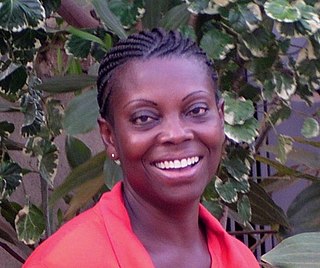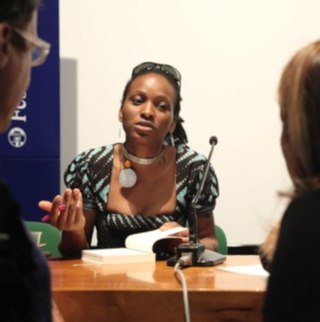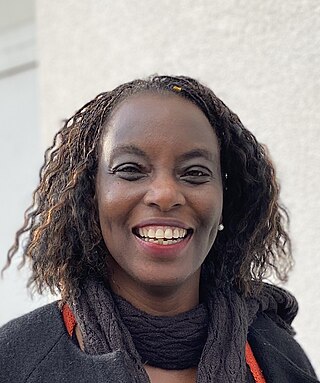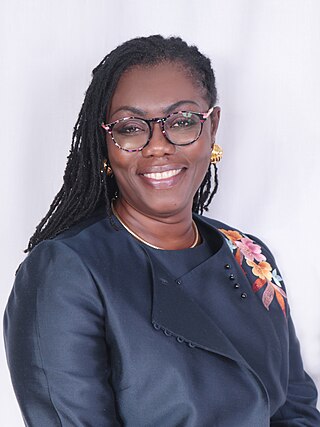
Amma Darko is a Ghanaian novelist. She won The Golden Baobab Prize for one of her novels. She has published seven novels in total.

Chika Nina Unigwe is a Nigerian-born Igbo author who writes in English and Dutch. In April 2014, she was selected for the Hay Festival's Africa39 list of 39 Sub-Saharan African writers aged under 40 with potential and talent to define future trends in African literature. Previously based in Belgium, she now lives in the United States.

Chief Funmilayo Ransome-Kuti, MON, also known as Funmilayo Aníkúlápó-Kuti, was a Nigerian educator, political campaigner, suffragist, and women's rights activist.

Yvonne Adhiambo Owuor is a Kenyan writer who is the author of novels, short stories and essays. She won the 2003 Caine Prize for African Writing for her story "Weight of Whispers".
Yorùbá names are the given names adopted primarily by speakers of the Yoruba language and the Yoruba diaspora.

Taiye Selasi is an American writer and photographer. Of Nigerian and Ghanaian origin, she describes herself as a "local" of Accra, Berlin, New York and Rome. In 2005, Selasi published "Bye-Bye, Babar ", her seminal text on Afropolitans. Her novel, Ghana Must Go, was published by Penguin in 2013.
Afropolitan is a term constructed from the name Africa and the ancient Greek word πολίτης ('politis'), meaning 'citizen'. It is an attempt at redefining African phenomena by, on the one hand, placing emphasis on ordinary citizens' experiences in Africa and, on the other hand, reconceptualizing the African Diaspora's relationship with the African continent. Afropolitanism is used and defined in various ways. The novelist Taiye Selasi and the political theorist Achille Mbembe are immediately associated with the coinage of the term and its fundamental theorization.

Teju Cole is a Nigerian American writer, photographer, and art historian. He is the author of a novella, Every Day Is for the Thief (2007); a novel, Open City (2011); an essay collection, Known and Strange Things (2016); a photobook, Punto d'Ombra (2016); and a second novel, Tremor (2023). Critics have praised his work as having "opened a new path in African literature."

Chinyere Yvonne Okoro is a Ghanaian Nigerian actress. Born to a Nigerian dad and Ghanaian mother, Yvonne Okoro is of mixed lineage and calls herself an African. Yvonne Okoro is from Koforidua in the Eastern Parts of Ghana. She received Ghana Movie Awards Best Actress Award in 2010 and was nominated for Africa Movie Academy Awards Best Actress twice in a row in 2011 and 2012 for her movies Pool Party and Single Six. She has also received four Africa Magic Viewers' Choice Award and in 2012 was honoured with a Distinguished Achievement Award at the Nigeria Excellence Awards.
Yvonne Nelson is a Ghanaian actress, model, film producer, author, entrepreneur and a former Miss Ghana Contestant. She has starred in several movies, including House of Gold (2013), Any Other Monday, In April, and Swings, and appeared in the limelight of the movie industry with a role she played in the "Princess Tyra" and "Playboy" movies. She has over 7.5M Followers on Instagram currently. With her surname as "Nelson", she is most likely to have a Tabom lineage.
Africa39 was a collaborative project initiated by the Hay Festival in partnership with Rainbow Book Club, celebrating Port Harcourt: UNESCO World Book Capital 2014 by identifying 39 of the most promising writers under the age of 40 with the potential and talent to define trends in the development of literature from Africa and the African diaspora. Launched in 2014, Africa39 followed the success of two previous Hay Festival initiatives linked to World Book Capital cities, Bogotá39 (2007) and Beirut39 (2009).

Single and Married is a 2012 Ghanaian Nigerian romantic blue comedy film, produced by Yvonne Nelson and directed by Pascal Amanfo. It stars Yvonne Nelson, Chris Attoh, Nadia Buari, Tana Adelana, Kofi Adjorlolo, Eddie Watson and Jane 'Efya' Awindor. The film "centres on the drama, the intrigue and the dirty little secrets of three male friends, their sex lives, being single or married, and all the in-betweens".

Kehinde Bankole is a Nigerian actress, model, and television host. She made her entertainment debut in Miss Commonwealth Nigeria 2003, then proceeded with MBGN 2004. She was named Revelation of the Year at the 2009 Best of Nollywood Awards, two years after her first screen feature in Wale Adenuga's Super Story.

Taiwo Ajai-Lycett, OON is a Nigerian actress,journalist, television presenter, and cosmetologist. Lycett is a feminist and was the first editor of Africa Woman magazine in the 1970s.

Ursula Owusu-Ekuful is a Ghanaian lawyer, women's rights activist, and a politician who has been actively involved in politics and public service. She is the former member of Parliament for Ablekuma West Constituency in the Greater Accra Region. She is currently the Minister of Communications and Digitalisation.

The Aké Arts and Book Festival is a literary and artistic event held annually in Nigeria. It was founded in 2013 by Lola Shoneyin, a Nigerian writer and poet, in Abeokuta. It features new and established writers from across the world, and its primary focus has been to promote, develop, and celebrate the creativity of African writers, poets, and artists. The Aké Arts and Book Festival has been described as the African continent's biggest annual gathering of literary writers, editors, critics, and readers. The festival has an official website and a dedicated magazine, known as the Aké Review.

Ghana Must Go is a 2016 Ghana-Nigerian romantic comedy film, directed by Frank Rajah Arase. It stars Yvonne Okoro, Blossom Chukwujekwu and Nkem Owoh. The film tells a story of two lovers of different countries on origin, and the challenges they faced especially from parents after disclosing their intention of getting married. This is the second film from Desamour Company, since Contract The film was screened privately at Filmhouse Cinemas, Surulere in May 2016.
Ghana Freedom was a Ghanaian art exhibition at the 2019 Venice Biennale, an international contemporary art biennial in which countries represent themselves through self-organizing national pavilions. The country's debut pavilion, also known as the Ghana pavilion, was highly anticipated and named a highlight of the overall Biennale by multiple journalists. The six participating artists—Felicia Abban, John Akomfrah, El Anatsui, Selasi Awusi Sosu, Ibrahim Mahama, and Lynette Yiadom-Boakye—represented a range of artist age, gender, locations, and prestige, selected by curator Nana Oforiatta Ayim. The show paired young and old artists across sculpture, filmmaking, and portraiture, and emphasized common threads across postcolonial Ghanaian culture in both its current inhabitants and the diaspora. Almost all of the art was commissioned specifically for the pavilion. Architect David Adjaye designed the pavilion with rusty red walls of imported soil to reflect the cylindrical, earthen dwellings of the Gurunsi within the Biennale's Arsenale exhibition space. The project was supported by the Ghana Ministry of Tourism and advised by former Biennale curator Okwui Enwezor. After the show's run, May–November 2019, works from the exhibition were set to display in Accra, Ghana's capital.
Peace Adzo Medie is a Liberian-born Ghanaian academic and writer of both fiction and nonfiction.













